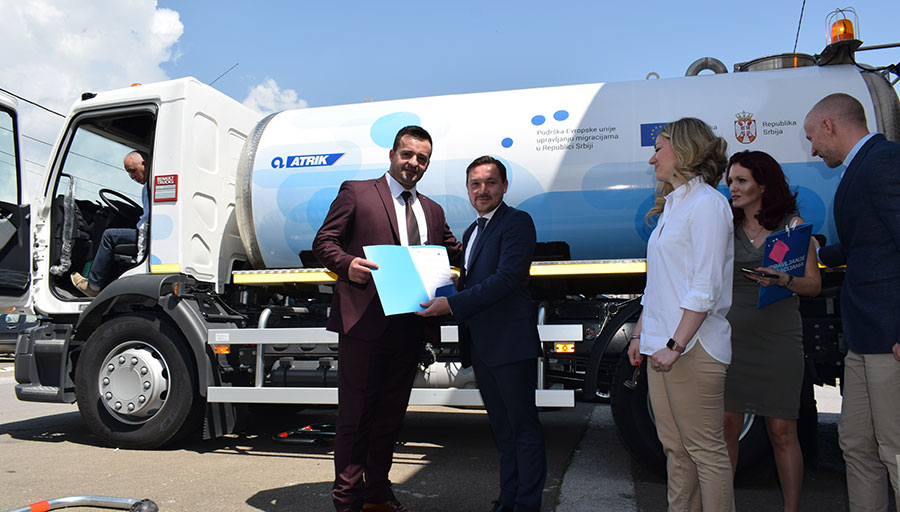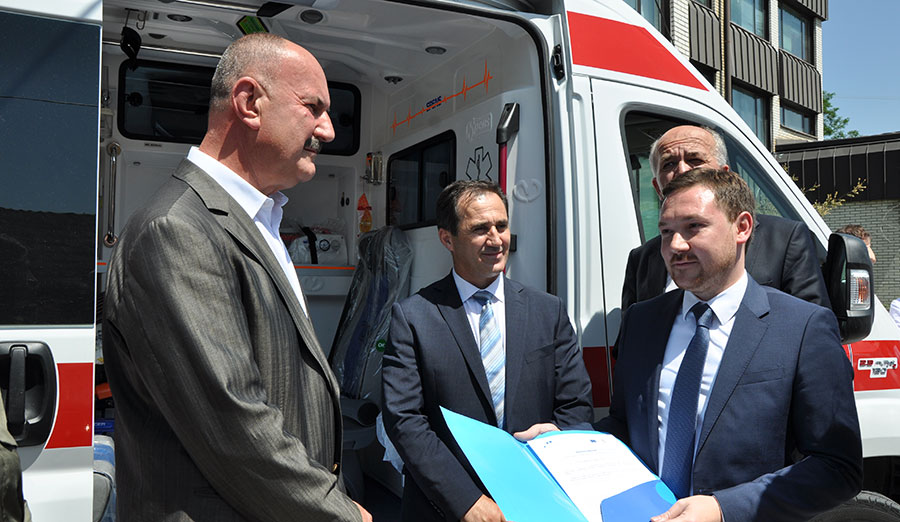Head of Operations I at the EU Delegation to Serbia Nicolas Bizel paid a visit to Tutin and Sjenica where he met with local self-government representatives whom he presented with donations aimed at improving the quality of social and healthcare services in the two municipalities.
During his visit to Tutin, Bizel – together with Serbian officials and representatives of implementing partners carrying out the activities within the project EU Support for Migration Management in the Republic of Serbia – met with the President of Tutin Municipality Kenan Hot with whom they discussed the latest developments in the area of migration. Following the meeting, they visited the Tutin Healthcare Centre and presented it with a fully equipped ambulance with a view to improving access to health services for the citizens of Tutin and migrants from the Tutin Asylum Centre. They went on to visit the preschool institution Maja, refurbished and upgraded thanks to EUR55,000 in EU funding. They continued their visit at the Asylum Centre, where the annex B has been built as part of the project EU Support for Migration Management in the Republic of Serbia, using the money allocated from the EU’s Regional Trust Fund in Response to the Syrian Crisis – Madad.
Just as at any other reception and asylum centre, the EU money was used to provide migrants – above all children and other vulnerable categories – with food, healthcare services, education and protection. The EU also covers the reception centre’s running costs.
“From the outset of increased migrant influx in 2015, the European Union has supported Serbia in its effort to manage migration with nearly EUR100 million, making it the largest single donor. We are well aware that Serbia’s response to the migration challenge would not be as effective without a significant contribution from local self-governments which host migrants and refugees. The EU therefore supports local self-governments to enhance their service delivery capacity in order to provide migrants and refugees with services they need. Tutin is another good example of cooperation between the EU and migrant hosting municipalities,“ Bizel said.
 Kenan Hot the President of Tutin Municipality thanked for the support offered and stressed the importance the donated ambulance had for the healthcare centre given the circumstances, i.e. the lack of working conditions and equipment, which is why patients often times have to seek medical services at other healthcare institutions in Serbia.
Kenan Hot the President of Tutin Municipality thanked for the support offered and stressed the importance the donated ambulance had for the healthcare centre given the circumstances, i.e. the lack of working conditions and equipment, which is why patients often times have to seek medical services at other healthcare institutions in Serbia.
”Tutin has received refugees with an open heart. We are trying to create conditions to make them feel good and forget they are far away from their homes as much as possible. EU support and the cooperation we have established in this and other sectors are very important to us and I hope they would continue and be further stepped up in the period ahead,” Kenan Hot said.
Said activities – through which Tutin has received support as a migrant hosting town – have been implemented by the UN Development Programme (UNDP), the World Health Organisation (WHO), the International Organisation for Migration (IOM), and the UN Office for Project Services (UNOPS).
EU Delegation’s Head of Operations I Nicolas Bizel started his visit to Sjenica at the municipal building where he delivered an ambulance and a water tank. The ambulance will improve access to healthcare services for the citizens of Sjenica and migrants accommodated at the Asylum Centre. On the other hand, the PUC Vrela has up to this point had only one water tank of this kind. Both donations, as well as the announced beginning of reconstruction of the Sjenica Asylum Centre, have been delivered and implemented as part of the programme EU Support for Migration Management in the Republic of Serbia.
Together with state officials and representatives of implementing partners, Bizel toured the Asylum Centre in Sjenica, where the reconstruction should be underway soon. Both the reconstruction and the operation of a mobile clinic – which provides healthcare services to migrants and local people – will be funded through Madad Regional Trust Fund.
At the Centre, EU funding has been used to provide accommodation, food, healthcare, education and protection for migrant children and other vulnerable categories, in particular. The EU is also covering the running costs of the Centre and its staff.
“We are aware of the challenge posed by increased number of migrants. Local institutions occupy a prominent place in migration management efforts, which is why we make sure our assistance reaches them. The European Union also supports health institutions and thus improves the quality of delivered services. I would like to reiterate that the inclusion of refugees and migrants in the healthcare system – the way you are doing it here in Serbia – is an example of good practice. The European Union will continue to support Serbia in these efforts,” Nicolas Bizel said.
Mikailo Kalicanin, Deputy President of the Sjenica Municipality, tanked the EU Delegation for everything it had done for Sjenica thus far.
“By doing so, they have once again confirmed their continued commitment to support the progress of this and other regions of our country. From our side, we have always given our best and mobilized all of our capacity to help implement projects wholeheartedly supported by our EU friends. That is the way to prove we are a part of Europe,” Kalicanin said.
Said activities – through which Sjenica has received support as a migrant hosting municipality – have been implemented by the UN Development Programme (UNDP), the World Health Organisation (WHO), the International Organisation for Migration (IOM), and the UN Office for Project Services (UNOPS).




